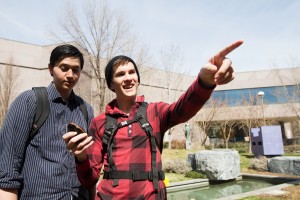The BYU study abroad group tore up the side of the mountain near Nazareth in northern Israel. Other tourists at this holy site wondered what gave these students so much energy on the steep climb up the famed Mount of the Precipice.
These BYU students were racing to a geocache, one of thousands of treasure boxes hidden by fellow adventurers all over the world that can be found with the aid of a GPS device. Geocaching adds another dimension to vacationing because it takes people off the beaten path to places they would not otherwise go.
Geocaching is searching for small treasure boxes all over the world using a GPS; coordinates are downloaded from geocaching.com onto a GPS device.

Jeremy Lindstrom, a recent BYU graduate in finance, started geocaching while abroad. He is a professional jump roper, and while attending a jump-roping camp in France, he was asked by his coach if he wanted to go geocaching. They went again several months later in Germany, and Lindstrom continued the hobby at home at BYU.
His favorite geocaching experience abroad occurred in Berlin. He and his group had just finished touring a World War II museum, and they decided to pass the time waiting for the train by geocaching.
“We stumbled into this giant, very well-kept rose garden that we wouldn’t normally have seen,” Lindstrom said. The treasure box, which contained small items that cachers can trade out, was hidden in the exquisite garden.
Other student geocachers have also found unexpected but exciting treasures. Sarah Zimmerman, a Middle Eastern Studies major, expected to find adventure during her study abroad in Jordan and Israel, but she didn’t expect to find it while geocaching.
“I thought, ‘Oh, adventure,’ and that’s all I understood,” Zimmerman said.
However, a classmate told her she had a goal to find a geocache in every country she visited.
“After further clarification, I realized that geocaching was basically a high-class scavenger hunt around the world,” Zimmerman said. Zimmerman said geocaching helped her feel more like a world citizen while abroad. She found it unifying because people from all over the world participate in it without supervision from any government or other organization.
This is what Laura Beth Parkinson, wife of Dilworth Parkinson, the Arabic Intensive Language-Learning Study Abroad director, discovered. She downloaded GPS coordinates and other geocache clues onto her iPad, and the study abroad group hiked to the top of the Mount of the Precipice near Nazareth. The hunt began once they reached the top, and they dug a small plastic container out of some bushes. One student left a BYU key chain in the geocache, and the group signed the logbook as “BYU Study Abroad” with pride.
“We left our BYU mark on that little container,” Zimmerman said.
Geocaching is a way to both leave a mark on the world and take a little something home.
“A lot of times there are real treasures,” Lindstrom said. “We’ve started a little collection of things that we’ve found around the country and around the world in little geocache containers.”
BYU Nursing Professor Renea Beckstrand described geocaching as “hiking with a purpose.” It has become a staple in all of her trips, and she has taken geocaching as far as Mexico City and the Bahamas.
“We have done them every place we’ve gone on vacation,” Beckstrand said. “It’s just a little addictive.”
For coordinates to the Universe’s very own treasure hunt click here, and to read more about Geocaching at BYU click here.




